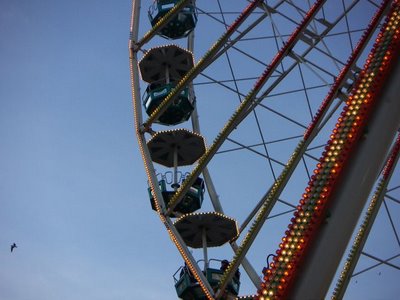now that's what I called music 2006

I'm sure I'm forgetting plenty...
Andrew Hill - Timelines (Blue Note)
At least the equal of any other of his Blue Note albums, Hill's music has perhaps never been so accurately played and felt. Ben Ratliff puts it at #1 and sums it up: "beautiful art out of drawling, truculent strands of music; recorded with his best band in 40 years, this is a master’s record, quiet, daring and magnificent."
Lionel Loueke - In A Trance
I don't know if you've heard, but solo voice + guitar album is a near-masterpiece (which might date back to 2005, I'm not sure). Loueke's baritone murmurs soft melodies that nestle up to bursts of dissonance, chants in quasi-Gregorian fashion atop Indian musings, scats along to rhythmically and harmonically knotty guitar lines or floats above discreet polyrhythmic percussion. Afro-freak-folk?
Ornette Coleman - Sound Grammar (Sound Grammar)
The first Coleman album I've been able to buy at the same time as everyone else. "Sleep Talking" is vying for my Single Of The Year spot: a beautiful melody one could spin infinite variations on. Coleman's alto is luminous, but I'm not too sure about the rest of the recording. Denardo in particular sounds distant and lo-fi. I'm also currently being blown away by the discovery of Ornette's quartet with Dewey Redman, Charlie Haden and Ed Blackwell, on The Belgrade Concert, which has me wondering how I made it through 28 years without it.
Ben Sluijs Quartet - Somewhere In Between (De Werf)
The reason I jumped on The Belgrade Concert when I saw it in the racks back in mid-December: I had intuitively felt a connection between the two quartets, and my intuition was right. A BSQ concert quartet back in February totally floored me. This live album confirms Sluijs's change of direction since True Nature and stretches it a whole lot further, but the altoist continues to tap powerfully into his previous, lyrical incarnation, thus somehow bringing together two radically different pianoless, two-saxophone quartet conceptions: Coleman's and Gerry Mulligan's.
Steve Coleman - Weaving Symbolics (Label Bleu)
Even the trios with Eric Revis and Tain don't necessarily go where you'd expect, so never mind the larger ensembles' tropical cubism.
Darcy James Argue's Secret Society - various concerts
Everyone knows big bands aren't cool. Yet DJA's music (and big band) is extremely cool. It's a happy paradox.
I love the fact that Darcy can write a new composition and have it listened to by all almost before the bandstand sweat has dried, lending urgency and relevance to the whole process. I'm much more eager to download, say, the second performance of "Habeas Corpus" than simply the MP3 version of an extant CD. Abandoning the album for a steady-stream approach sounds good to me.
Had I been able to make Darcy's Köln concert, it would have been a nice treble amongst the four Nate Chinen correctly anointed jazzbloggers of 2006. Maybe next year.
John Hollenbeck Large Ensemble - A Blessing (OmniTone)
Everyone knows big... oh, I already said that. Less "traditional" than Darcy, partly because soloists are (totally?) eliminated and Hollenbeck seems to draw more explicitly on American Minimalism.
Destination: Out
Amazing and educational work. My single favourite track posted: Threadgill's "Theme From Thomas Cole."
The Claudia Quintet - Semi-Formal (Cuneiform)
Hollenbeck again. Composer-rock rhythms, intricate composition/arrangement/improvisation blend (pillowy vibraphone sound vs. prickly accordion; Chris Speed as much in the middle of the sound as he is on top) and accessible-yet-challenging "tonal-to-free" harmonic context. The first two tracks, as a sequence, are mind-blowing and remind me of the Threadgill track.
Justin Timberlake - FutureSex/LoveSounds
The remake of an old movie in which Quincy met Michael. Hits the two key demographics: teenyboppers and music critics.
Ellery Eskelin - Quiet Music (prime source)
Proof that Ellery's "signal oeuvre" (to quote Steve Smith) will extend beyond his Hat Hut days. Singer Jessica Constable is now fully integrated, but the ensemble bounces between the founding trio, the vocal quartet, two-keyboard quintet extravaganzas and surprisingly intimate trios, the last two with Philippe Gelda. Ellery's musical imagination consistently stuns and delights me.
Corey Dargel - Less Famous Than You (Use Your Teeth)
Yes, it really is that good.
The Roots - Game Theory (Def Jam)
Phrenology wasn't as bad (or as difficult: it's no Drawing Restraint 9) as people said. The Tipping Point was as bad as people said. Game Theory is as great as people say. The scope and details of many of the tracks blow me away, as does Black Thought's rapping (mostly). Malik B is ridiculous on "Here I Come."
Bojan Z - Xenophonia (Label Bleu)
The wonky homemade Fender Rhodes is his secret weapon.
Lisbon Improvisation Players - Spiritualized (Clean Feed)
Altoist/baritonist Rodrigo Amado is adept at setting free-floating melodies in an amorphous context. Guest Dennis Gonzalez is more pragmatic, but just as melodic, framing the music with riffs. Anything is possible: from unaccompanied eight-note bopping to throaty drones and squeaky squawks. The Pedro Gonçalves and Bruno Pedroso rhythm section is fluid yet focused enough for mood shifts to really register. Cellist Ulrich Mitzlaff joins on the last two tracks, the first of which unfortunately becomes clumpy pointillism (i.e. pling-pling-crash improv) and the second of which is the soothing, patient title track. See also the first LIP album, which I discovered last spring in Lisbon.
Gnarls Barkley - St. Elsewhere
The one monkey that did stop the show.
Rawfishboys - RaW
28 minutes of simple, heart-rending clarinet-bass songs with a few harsher improvisations thrown in. First mentioned here. Clarinetist Joachim Badenhorst has made a big late-in-the-year impression, both on record (see also Red Rocket) and live (Skakk Trio, Kaat Hellings).
TV On The Radio - Return To Cookie Mountain
Awesome recorded, monstruous live.
|